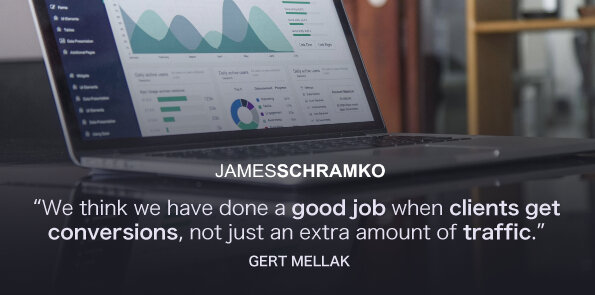Podcast: Download (Duration: 26:19 — 24.9MB)
Get Notified Of Future Episodes Apple Podcasts | Spotify | Amazon Music | Android | Blubrry | Gaana | TuneIn | Deezer | Anghami | RSS | More
Branded search is not often talked about, but it plays an important part in your Google ranking.
In this episode, James and SEOLeverage’s Gert Mellak talk about brand SEO.
They discuss branded search in relation to non branded search.
Gert lays out what success looks like for a branded campaign.
And our experts stress the need for consistency in branding to get the ranking and conversions you’re after.
Table of contents
1. Branded SEO – what is it?
2. A layered approach to SEO
3. Educating the child Google
4. What branded campaign success looks like
5. Google My Business and the knowledge panel
6. Consistency is key
7. Tackled so far…
8. How social media impacts things
9. Are we already getting branded results?
10. When people hijack your brand
11. The stuff that’s ranking well
12. Where do reviews come in?
13. The episode takeaways
Branded SEO – what is it?
A good place to start is defining branded SEO.
Branded SEO simply means optimizing your website’s online presence for searches that include your brand’s name. These searches can include the brand name plus other keywords or phrases, such as “James Schramko revenue share.”
Branded SEO can help increase a brand’s visibility and reputation, as well as attract more qualified leads, because people who search for branded keywords are typically already familiar with the brand and are looking for more specific information or opinions.
Through branded SEO, content creators can leverage their personal brand and their expertise in a specific field to attract more traffic to their website. It’s also relatively easy to rank for branded keywords, says Gert, which makes it an accessible and effective strategy for businesses of all sizes.
By optimizing for branded searches, brands can take control of their reputation and increase their exposure to potential customers who are already interested in what they have to offer.
A layered approach to SEO
Gert typically takes a layered or multi-step approach to SEO, with SEO being part of the customer journey multiple times.
This means, if he’s selling SEO services, people might discover him through certain things he talks about, such as ranking drops. Then they discover his brand SEO Leverage, which allows them later to type in the brand name when they have an SEO-related concern.
Educating the child Google
Supposing you had either a common name, or a unique name for your business, would it still be possible to rank on page one of Google, asks James?
There’s a chance, says Gert, but it’s all about educating the search engine about who you are and what you do. This involves a repetitive process of solidifying Google’s perception of your brand, similar to how parents repeat instructions to their children for them to understand better.
Educating Google involves positioning yourself as an authority in your market and consistently communicating your brand message to the search engine. By doing this, you can increase your chances of ranking higher in search results and becoming visible to potential customers.
It is essential, stresses Gert, to communicate clearly and consistently, so Google knows how to perceive your brand and present it to its users. Ultimately, this education is an ongoing process that requires continuous effort and consistency.
What branded campaign success looks like
So what would qualify as success for a branded campaign?
Part of what you’re looking for is control, says Gert. You want to control what appears on page one when searching for your brand or name. This can vary depending on the platform, with social media, for instance, providing only partial control.
The more control a brand has over what appears on page one, the more successful their search branding efforts will be.
James checks his own name occasionally to see what comes up. The very reason he got his domain, he says, was to outrank IMDb, where he was listed for his acting performances. He emphasizes the importance of controlling his own brand name and suggests it is good practice for others to do the same.
Google My Business and the knowledge panel
James is curious – The right-hand panel on a Google search for his name contains information about him, with links to his book and social profiles. Can Gert talk about that and how it’s achievable?
The right hand side, says Gert, can contain a Google business profile or a knowledge panel, the latter of which is triggered by Google’s understanding of an entity such as a person or business.
Positive reviews on a Google My Business listing can quickly improve the way a website is shown on Google, while a knowledge panel requires consistent work to convince Google that the information about the entity corroborates with other sources.
Consistency is key
Consistency is crucial, says Gert, in maintaining a good online presence, especially when it comes to information about yourself. This means ensuring that information on different websites jives with what is on your website, and reaching out to others to make changes if needed.
The title of your website is still important, Gert adds, and he recommends a combination of your brand and relevant keywords.
Tackled so far…
James sums up the discussion so far as covering the importance of search branding analysis, to be aware of what comes up when people search for a brand across different markets. The audit needs to look at what other people are saying about the brand, how they are linking to it, and what words are on their page title.
The goal of this is to ensure consistency of information about the brand across different sources.
Note, says Gert, where you run your analysis is important. The results will likely be different across different markets.
How social media impacts things
Consistency has thus far been established as essential, and it applies to social media as well. James and Gert talk about the need for consistency in social media profiles, and in controlling the name, bio, and information across different platforms.
Are we already getting branded results?
How do we know if we’re already getting branded search results, asks James? And if we are, what can we do with that information?
There are some wrong assumptions people make when it comes to SEO, says Gert, such as focusing solely on ranking for a particular keyword when what you really want is conversions.
You could be getting a lot of branded traffic and not be ranking for a single relevant keyword, that is, a keyword related to a pain point for which people need help.
That’s why at SEO Leverage Gert and his team conduct both branded and non-branded search analysis to understand where traffic is coming from and to develop strategies accordingly.
If 80% of your traffic is branded, for instance, it could be a good time to build up some keyword content.
When people hijack your brand
Gert had a client who was selling an online course and had built up brand recognition over the years. They discovered a competitor was piggybacking on their exposure by reviewing the course and then offering his for a lower price.
A brand hijack, says James. And how would Gert address that?
The first strategy, says Gert, would be to see if this was something they could control on the website. Legal action, unfortunately, is usually not effective, and may even give the offender fuel to use against you.
The more effective approach is to outrank the hijacker’s content with your own content, using SEO tactics and other methods like guest appearances on podcasts and social media engagement.
The stuff that’s ranking well
What sort of content is ranking strongly these days?
Gert suggests that videos for personal searches, Twitter with good engagement, brand-optimized images, and guest posts or appearances on other people’s podcasts are among the content types that Google favors.
Ultimately, there are various strategies to push results up in search rankings, but SEO work is necessary to make the content relevant to Google.
Where do reviews come in?
And what about reviews, asks James?
Reviews are important for reputation, says Gert, and it’s crucial to respond to them and encourage positive reviews because they act as a cushion in case a negative one comes in.
Negative reviews can do some harm, and it’s important to take the discussion off the review sites to avoid engagement that will drive it up in Google.
The episode takeaways
If you haven’t thought about it till now, says James, it’s worth doing a little review of your brand exposure. See if other people are using your brand, and do something about it; adjust your profiles and bios to be more consistent, and control the content you put on social profiles or discussion threads so that if they do get randomly picked up it will be in your favor.
If you need help with any of that, Gert is at SEOLeverage.com, and James can vouch for his expertise and results.
Let us know if you liked this episode – leave a comment, share it with a friend, or post it somewhere on socials.
Liked the show? Leave us a review on iTunes













Leave a Reply